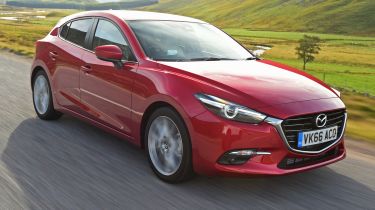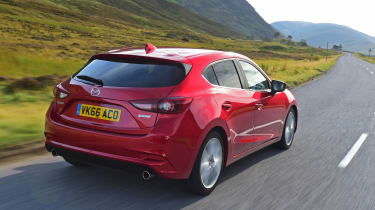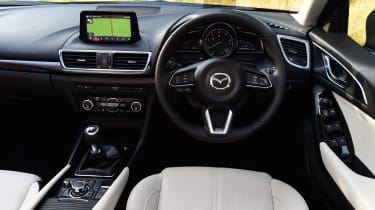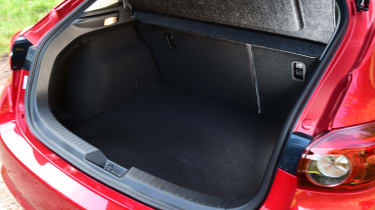New Mazda 3 2016 facelift review
The stylish Mazda 3 hatch gets G-Vectoring tech like 6 saloon - we drive the lightly facelifted model in the UK

It’s not the cheapest or most practical hatchback around, but the Mazda 3’s incremental improvements for 2017 build on an already strong package. The combination of an enjoyable driving experience, attractive design, and decent efficiency make it a credible alternative to a Vauxhall Astra or SEAT Leon.
Only last month we drove Mazda’s refreshed 6 for the first time, and now it’s the turn of its smaller sibling to benefit from a range of 2017 Model Year updates.
The Japanese hatchback doesn’t have an easy job on its hands, though. Rivals like the excellent SEAT Leon and VW Golf continue to sell in huge numbers, while talented newcomers like the Vauxhall Astra and Renault Megane have moved the game on since the Mazda’s 2014 launch.
The updates to the Mazda 3 are towards the more minor end of the scale, but there are a few noticeable exterior tweaks. The front grille is larger, with chunkier chrome surrounds and a lowered badge bringing the 3 closer in design to the more modern CX-3 SUV. The headlights are redesigned, too, and adaptive LED tech replaces the old xenon units. There’s new door mirror-mounted indicators, while the rear bumper has some more muscular slashes in it. Nothing drastic, then, but Mazda makes the point that the 3’s stylish external look didn’t need much fettling – and we’d be inclined to agree.
Used - available now
The changes to the interior are a little more noticeable. There’s a redesigned steering wheel and better quality switchgear, while the improved door and dash materials are welcome in a sector where fit and finish has made great strides recently. The nasty fake carbon-fibre door trim has been ditched for smarter gloss black trim, while bigger door bins, a thinner central infotainment screen and a full colour head-up display offer a more considered cabin.
It’s certainly one of the more attractive interiors in the class, with a real focus on the driver in the design. Most surfaces feel classy and solid, too, while Mazda’s superbly intuitive infotainment software remains largely unaffected. We’ll leave you to decide if the removal of the ‘proper’ handbrake for a fashionable electric setup is a good thing, but there’s no arguing that the two new cupholders it allows are a bonus. Passenger space is unchanged – and while the Mazda isn’t particularly cramped, there are a number of more accommodating hatchbacks on sale.
Surprisingly, it’s the 2.0-litre petrol engine that’s marginally the biggest seller in the UK, but we’re trying the 2.2-litre diesel engine here – mainly because it’s the only unit in the range that’s been revised. A new system called ‘Transient Control’ aims to reduce the effect of turbo lag, while a ‘natural sound smoother’ is a physical device that sits in the engine’s pistons to improve low rev refinement.
Both systems work well – the gutsy and refined 2.2-litre unit was already our favourite engine in the 3, and this fractionally more responsive and smoother unit is even better. It’s not a revelation, though, more a minor improvement, meaning owners of the current car probably won’t rush to trade theirs in.
Rewarding pulling power is still matched by strong efficiency: the 68.9mpg combined figure is the same as before, as are CO2 emissions of 107g/km.
Mazda has also seen fit to tweak the suspension to improve comfort and agility, but the biggest addition – so they say – is the new G-Vectoring system. As we tried in the 2017 Mazda 6, the tech subtly trims torque delivery depending on steering angle to reduce body movement and smooth out faster cornering manouvers.
Bosses say the system is imperceptible, and indeed they’re right – as we couldn’t really feel any difference. We question whether it's as effective as Mazda claims, but it doesn’t detract from the 3 being one of the most enjoyable drives in the sector. Here, neat body control is perfectly matched with keen turn-in, accurate steering and a snickety, short-throw gearshift.
The tweaks, to some extent, have helped soften the firm edge to the ride. It's still fidgety on very pockmarked tarmac, but on most surfaces the Mazda is controlled and smooth. A Renault Megane remains both more cossetting and more insulating of wind and road noise, however, despite claims of improved sound insulation.
Mazda is asking around £200 extra spec-for-spec for the updated car. But when you consider the changes – on top of features like an improved autonomous emergency braking system that operates at a higher speed and (on top models) a heated steering wheel – it doesn’t seem like an awful lot to ask. This top-spec Sport Nav model is right at the top-end of the segment price-wise, however.














